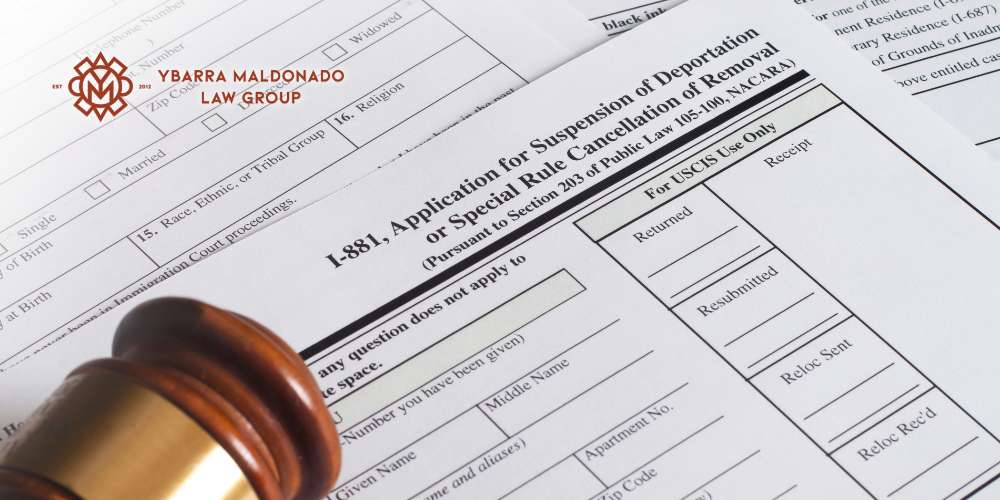MIAMI DEPORTATION DEFENSE LAWYER
PRACTICE AREAS
DON’T HESITATE TO REACH OUT TO US!
Our Law Firm is committed to becoming the best Law Firm for Latino, migrant, and Spanish speaking communities in Arizona and Florida.
Top Miami Deportation Defense Attorneys with a Deep Understanding of Immigration Law
Facing the threat of deportation is an overwhelming and stressful experience, especially when your future and family are on the line. Whether you or a loved one have been placed in removal proceedings, understanding your legal options is critical. At Ybarra Maldonado Law Group, our dedicated Miami immigration attorneys fight tirelessly to protect the rights of immigrants and their families.
We serve clients facing deportation by exploring every possible defense strategy to keep them in the United States. Our experienced Miami deportation defense lawyers are here to guide you through this complex process, offering compassionate, aggressive legal representation. If you or a loved one are at risk of deportation, contact us today at (602) 910-4040 to discuss your case and start building a strong defense.

What Is Deportation?
Deportation is the legal process of removing a non-citizen from the United States due to an alleged violation of immigration laws. It occurs when an individual’s immigration status is challenged, often leading to removal proceedings in immigration court.
The Department of Homeland Security oversees deportation cases, which can result from unlawful entry, visa overstays, or certain criminal convictions. Those facing deportation have legal options to challenge their removal and seek relief through various defense strategies.
Why Do Immigrants Face Removal Proceedings in Florida?
Immigrants may face deportation proceedings for various reasons, including violations of immigration laws such as unlawful entry, overstaying a visa, or committing certain criminal offenses. The U.S. government prioritizes immigration enforcement for individuals who pose a potential risk to national security, but many non-citizens also find themselves in removal proceedings due to technical violations or changes in their immigration status.
Understanding the most common reasons for deportation is crucial for those seeking to protect their right to remain in the country.
Unlawful Entry
Entering the United States without inspection or authorization is one of the most common reasons for removal cases. When an individual crosses the border without proper documentation or permission from immigration authorities, they may be subject to immediate deportation or placed in formal removal proceedings. While some individuals may qualify for asylum or other legal protections, those who entered unlawfully often face significant legal hurdles when trying to remain in the U.S.
Additionally, those who re-enter the country after deportation without authorization could be charged with illegal reentry. Both illegal entry and illegal reentry are federal crimes and can result in jail time and fines, in addition to deportation.
Overstaying a Visa
When a person enters the U.S. on a valid visa but remains beyond its expiration date, they are considered to have overstayed. Even if they have resided continuously in the country for years, overstaying a visa can lead to removal proceedings. Some non-citizens may qualify for relief, such as adjustment of status or waivers, but their options depend on the length of their overstay and whether they have a lawful path to remain in the U.S.
Criminal Charges That Can Lead to Deportation
Certain criminal convictions can result in removal proceedings, particularly if they involve crimes of moral turpitude, aggravated felonies, or offenses deemed to threaten public safety. Certain crimes, such as drug-related offenses, fraud, domestic violence, or violent felonies, can make a non-citizen deportable even if they have lived in the U.S. for many years.
Legal representation is critical in these cases, as some criminal convictions may be challenged or mitigated to prevent deportation. The immigration criminal attorneys at Ybarra Maldonado Law Group have extensive experience handling cases in which there is significant overlap of both criminal and immigration laws.

How Does Deportation Work in Miami?
Deportation follows a legal process that begins when the U.S. government initiates removal proceedings against a non-citizen. This process typically starts with an arrest by immigration authorities or a notice to appear in immigration court. The individual then attends hearings where they can present a defense with the help of an immigration attorney.
If the judge rules in favor of deportation, the person may be removed from the U.S. unless they appeal the decision or qualify for relief, such as asylum or cancellation of removal. Having legal representation is crucial to navigating this complex process and increasing the chances of a favorable outcome.
Understanding the Deportation and Removal Process in Florida
The deportation process can be overwhelming, especially for individuals unfamiliar with deportation hearings and legal procedures. In Florida, Immigration and Customs Enforcement (ICE) initiates removal cases by detaining individuals or issuing them a notice to appear in immigration court.
From the initial ICE arrest to court hearings and final decisions, each step of the process is critical. Understanding how deportation proceedings unfold can help individuals and their families prepare for the challenges ahead and seek the best possible legal defense.
The Immigration Arrest
Deportation cases often begin with an arrest by immigration authorities. Immigration and Customs Enforcement (ICE) may detain an individual due to a violation of immigration laws, a criminal offense, or after an immigration status check. Once detained, the individual is placed in deportation proceedings, where they will be scheduled for hearings before an immigration judge.
In some cases, the person may be eligible for release on bond while their case is pending. Seeking legal representation immediately can help protect the individual’s rights and increase their chances of staying in the U.S.
The Master Calendar Hearing
The master calendar hearing is the first formal court appearance in the deportation process. During this hearing, an immigration judge reviews the charges against the individual and explains their legal options. The individual, or their attorney, can contest the charges, request additional time to prepare, or indicate their intent to apply for relief from removal.
These hearings take place in immigration court and serve as an opportunity to determine the next steps in the case. It is crucial to have an experienced immigration attorney present to advocate for the best possible outcome.
The Individual Hearing
The individual hearing is the main event in the deportation process, often referred to as the removal hearing in immigration courts. During this hearing, the individual and their attorney present evidence and arguments to defend against deportation. Witnesses may testify, and the government will present its case for removal.
The immigration judge will then decide whether the individual qualifies for relief or must leave the country. A well-prepared legal defense can significantly impact the final decision, making skilled legal representation essential.
What Are the Types of Deportation Defense?
There are several defense strategies available to individuals facing removal proceedings, depending on their circumstances and eligibility for relief. Common deportation defense methods include cancellation of removal, withholding of removal, voluntary departures, adjustment of status, cancellation of VAWA, seeking asylum, and prosecutorial discretion.
Each of these options requires strong legal arguments and supporting evidence, making the assistance of experienced legal counsel essential. An immigration lawyer can assess the details of a case, determine the best defense strategy, and advocate for the individual’s right to remain in the United States.
Cancellation of Removal
Cancellation of removal is a removal defense available to certain non-citizens who have established long-term residency in the U.S. and meet specific eligibility requirements. For lawful permanent residents, this option can prevent deportation if they can prove continuous residence, good moral character, and that their removal would cause extreme hardship to qualifying family members. Non-permanent residents must also demonstrate they have lived in the U.S. for at least ten years and that their facing deportation would cause exceptional hardship to a spouse, parent, or child who is a U.S. citizen or lawful permanent resident.
Withholding of Removal
Withholding of removal is a form of removal defense that protects individuals from deportation if they can prove they would face persecution in their home country due to race, religion, nationality, political opinion, or membership in a particular social group. Unlike asylum, it does not lead to permanent residency but allows the individual to remain in the U.S. with work authorization. This option is often complex, requiring experienced immigration lawyers to gather substantial evidence and present a strong case in immigration court.
Voluntary Departures
Voluntary departure allows a non-citizen to leave the U.S. on their own terms instead of being forcibly deported. This option can help individuals avoid the legal consequences of deportation, such as lengthy bars on re-entry. In some cases, Immigration and Customs Enforcement (ICE) may grant voluntary departure before formal removal proceedings begin. Alternatively, an immigration judge may approve voluntary departure at the end of a case, but strict conditions and deadlines must be met to avoid further penalties.
Adjustment of Status
For individuals who are eligible, adjustment of status can be a powerful defense against deportation. This process allows non-citizens to apply for lawful permanent residency (a green card) without leaving the U.S. If an individual is married to a U.S. citizen, has an approved family or employment-based petition, or qualifies under other special provisions, an immigration attorney can help them navigate the process and prevent removal. Adjustment of status requires meeting eligibility criteria and ensuring all documentation is properly filed.
Cancellation of Removal Under VAWA
Under the Violence Against Women Act (VAWA), certain victims of domestic abuse may apply for cancellation of removal to remain in the U.S. without relying on their abuser for immigration status. This protection is available to spouses, children, or parents of U.S. citizens or lawful permanent residents who have suffered battery or extreme cruelty. The case must be presented in immigration court, where the applicant must prove the abuse, good moral character, and continuous residence in the U.S. for at least three years.
Seeking Asylum
Individuals who have suffered persecution or fear future harm in their home country due to their race, religion, nationality, political opinion, or membership in a particular social group may seek asylum in the U.S. The process involves filing an application, attending hearings in immigration court, and presenting evidence supporting their claim. A strong asylum case requires thorough documentation and testimony, which is why working with our experienced Miami deportation defense lawyers is crucial.
Prosecutorial Discretion
Prosecutorial discretion allows immigration authorities to deprioritize or close certain deportation defense cases based on humanitarian factors, such as a person’s family ties, length of time in the U.S., or contributions to the community. If granted, the case may be administratively closed, delaying or stopping removal. This form of relief is not guaranteed and depends on the policies of immigration authorities and the discretion of the immigration court. Having a knowledgeable immigration attorney can improve the chances of securing this relief.

Contact Our Experienced Attorneys for Deportation Defense and Immigration Services in Miami, FL
Deportation is a life-changing event, but you don’t have to face it alone. At Ybarra Maldonado Law Group, our Florida legal team is committed to providing skilled and compassionate representation to those fighting to stay in the U.S. With extensive experience in immigration law, we understand the challenges immigrants face and work tirelessly to protect their rights.
Whether your case is in Orlando immigration court or anywhere in Florida, we are prepared to stand by your side and fight for the best possible outcome. Don’t wait: contact Ybarra Maldonado Law Group today at (602) 910-4040 or contact us online for a confidential case evaluation and let us help you secure your future.
TELL US YOUR STORY.
